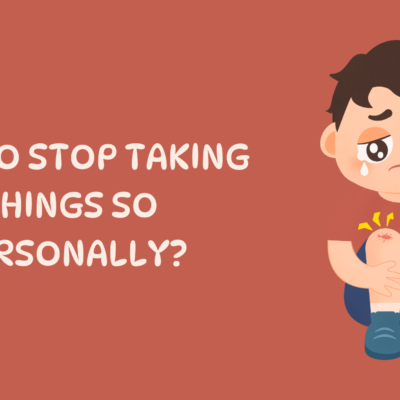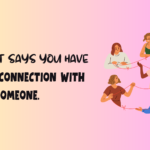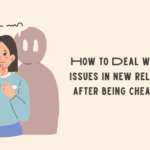How to Stop Taking Things so Personally: Taking things personally can be exhausting. Whether it’s a critical comment from a colleague, a friend’s offhand remark, or a disagreement with a loved one, it’s easy to feel hurt or offended. When we take things personally, we often assume that others’ words or actions are a reflection of us, rather than seeing them as separate from our self-worth.
If you find yourself constantly feeling hurt, misunderstood, or defensive, this article will help you understand why you take things personally and how to stop. By shifting your mindset and adopting healthier perspectives, you can build emotional resilience and gain more control over your reactions.
Also Read:
Why Do We Take Things Personally?
Before learning how to stop taking things personally, it’s important to understand why we do it in the first place. Here are some common reasons:
1. Low Self-Esteem
When we struggle with self-doubt, we’re more likely to see criticism as confirmation of our flaws. A simple remark can feel like an attack on our identity.
2. Seeking External Validation
If we rely on others to validate our worth, any negative comment or perceived rejection can feel like a personal attack.
3. Overgeneralization
Sometimes, we make a small comment or event mean something bigger than it actually is. For example, if a friend cancels plans, we might think, “They don’t like me anymore.”
4. Personalizing Others’ Actions
People’s words and actions are usually more about them than about us. However, we often interpret them through a personal lens.
5. Sensitivity to Rejection
Past experiences of rejection or criticism can make us more sensitive. Even neutral comments can feel like direct attacks if they trigger old wounds.
Now that we understand why we take things personally, let’s explore how to stop.
Strategies to Stop Taking Things Personally
1. Recognize That It’s Not About You
People’s reactions, opinions, and behaviors are shaped by their own experiences, emotions, and struggles. If someone is rude or dismissive, it’s often a reflection of their mood or insecurities, not your worth.
Action Tip: Next time someone says something hurtful, ask yourself, “Is this really about me, or is it about them?”
2. Practice Emotional Detachment
Emotional detachment doesn’t mean becoming cold or indifferent. It means creating a healthy distance between yourself and others’ opinions so that their words don’t define you.
Action Tip: Instead of reacting immediately, take a deep breath and remind yourself that you are in control of your emotions.
3. Build Self-Confidence
When you have a strong sense of self-worth, criticism and negativity won’t affect you as much. Confidence helps you separate your identity from what others think of you.
Action Tip: Make a list of your strengths, achievements, and positive qualities. Remind yourself of these when you start to feel defensive.
4. Change Your Internal Dialogue
The way you talk to yourself influences how you interpret situations. If you think, “They must think I’m stupid,” you’ll feel hurt. But if you think, “They’re just sharing their opinion, and that’s okay,” you’ll feel more at ease.
Action Tip: Replace self-critical thoughts with empowering ones, such as:
- “I am not defined by others’ opinions.”
- “It’s okay for people to have different perspectives.”
- “I choose to stay calm and confident.”
5. Ask Yourself: “Will This Matter in a Year?”
Many of the things we take personally are temporary and insignificant in the grand scheme of life. What seems like a big deal now will likely be forgotten in a few months or years.
Action Tip: When you feel hurt, ask yourself: “Will I care about this in a year? Is this worth my energy?” Most of the time, the answer will be no.
6. Stop Overanalyzing Situations
We often read too much into situations, creating problems that don’t exist. If someone doesn’t reply to your message, it doesn’t mean they’re ignoring you—it could just mean they’re busy.
Action Tip: When you catch yourself overthinking, pause and ask, “What’s another possible explanation for this situation?”
7. Develop a Sense of Humor
Learning to laugh at yourself and at life’s absurdities can make you less sensitive to criticism. When you don’t take yourself too seriously, others’ opinions won’t bother you as much.
Action Tip: Try to find the humor in frustrating situations. Instead of feeling insulted, think, “Well, that was an interesting comment!” and move on.
8. Set Healthy Boundaries
If someone constantly makes you feel bad, it might be time to set boundaries. You don’t have to engage with negativity or allow others to treat you poorly.
Action Tip: If someone is overly critical or rude, calmly say, “I’d appreciate it if we kept the conversation respectful.”
9. Practice Mindfulness
Mindfulness helps you stay present and prevents you from getting lost in negative thoughts. When you’re mindful, you observe emotions without letting them control you.
Action Tip: Practice deep breathing, meditation, or simply focus on the present moment when you feel triggered.
10. Surround Yourself with Supportive People
Being around people who uplift and encourage you makes a huge difference. If certain people constantly bring you down, limit your time with them.
Action Tip: Spend more time with friends, family, and mentors who help you feel valued and respected.
What If Someone’s Criticism Is Valid?
Sometimes, criticism isn’t meant to hurt us—it’s meant to help us grow. Instead of getting defensive, try to see if there’s value in the feedback.
How to Handle Constructive Criticism:
- Pause Before Reacting: Take a deep breath and listen carefully.
- Separate the Message from the Delivery: Even if the person isn’t polite, their message might still have some truth.
- Thank Them for Their Feedback: Even if it stings, appreciate that they took the time to share their thoughts.
- Use It as a Learning Experience: If the feedback is useful, apply it to improve yourself.
Remember, growth comes from discomfort. If you can learn from criticism instead of taking it personally, you’ll become stronger and more confident.
Final Thoughts
Taking things personally can drain your energy, lower your confidence, and create unnecessary stress. But with practice, you can learn to detach from negativity, build self-assurance, and respond to situations with clarity and grace.
Next time you feel hurt by someone’s words, remember: Their opinion does not define you. You are in control of how you react, and you have the power to choose peace over unnecessary emotional pain.








